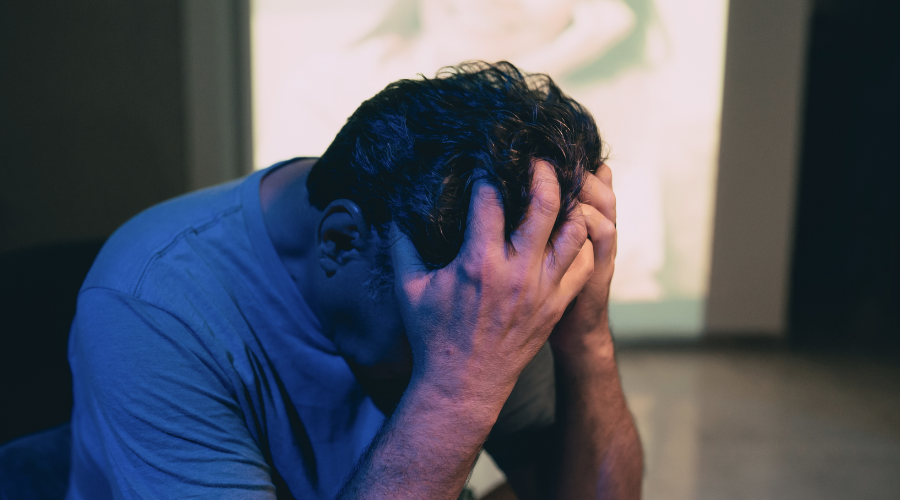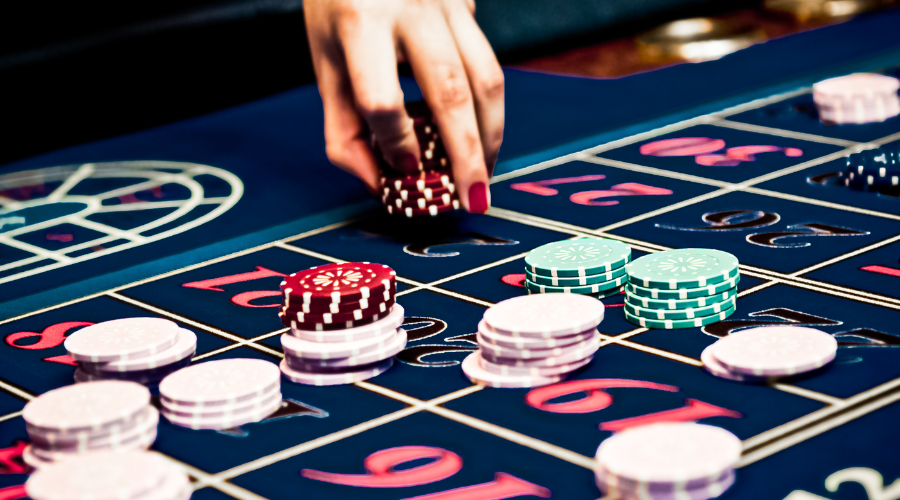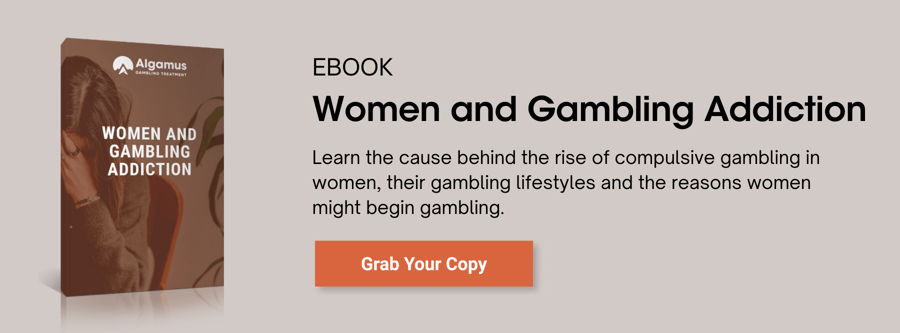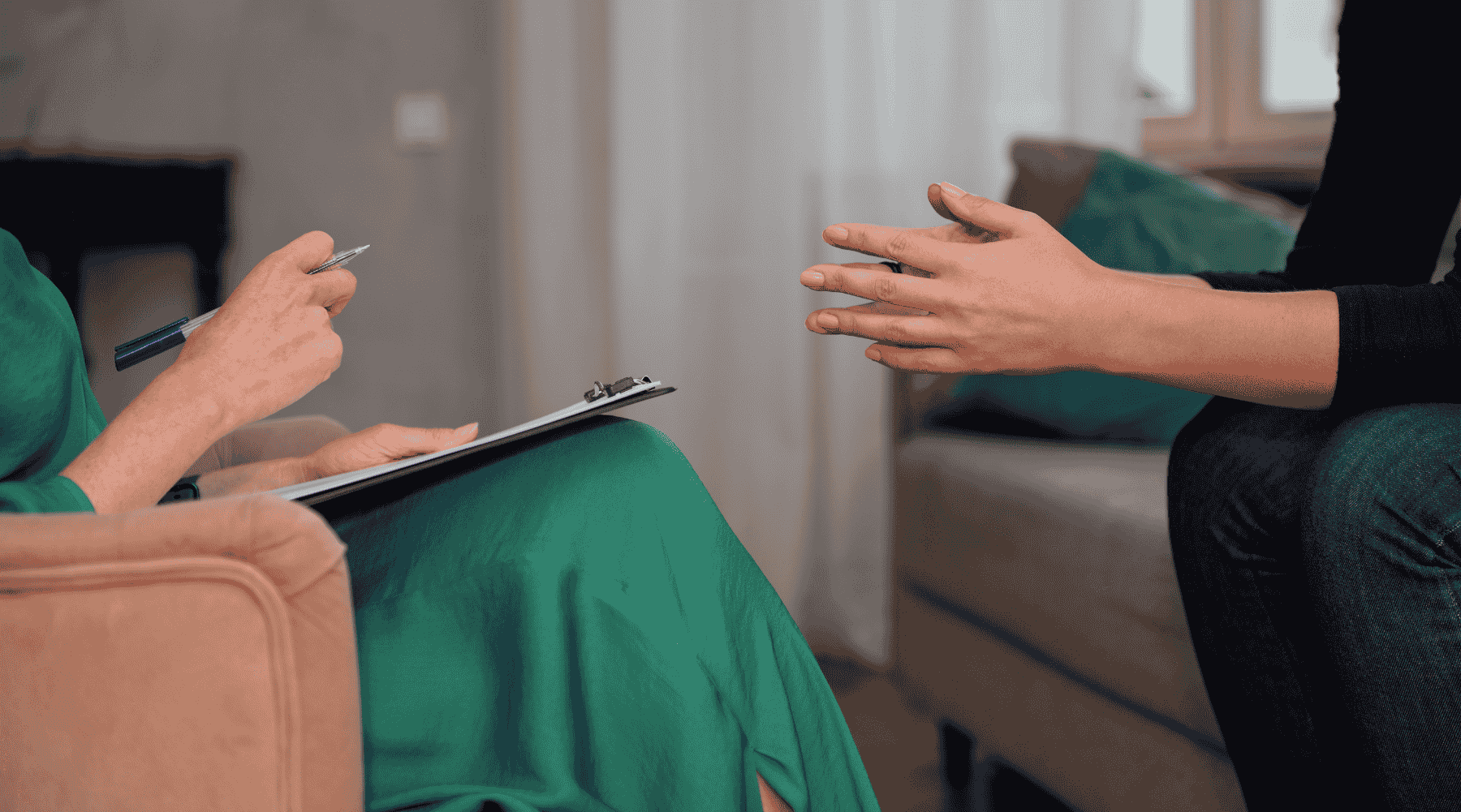By Rick Benson
Are you or someone you know struggling with problem gambling? It's important to understand that problem gambling is not just a matter of personal weakness but can be linked to mental health issues, particularly depression. In this blog, we will delve into the connection between problem gambling and depression, exploring the impact it can have on individuals and their loved ones. We'll also discuss differentiating problem gambling from recreational gambling and provide insights on how to support someone who is struggling. Additionally, we'll explore preventative measures, legal implications, and the impact of COVID-19 on this issue. With personal stories of recovery and research-backed information, this blog aims to shed light on problem gambling and depression and offer guidance for those seeking help and support.
Understanding Problem Gambling
Problem gambling is a term used to describe a behavior that goes beyond recreational gambling. It involves the compulsive urge to gamble, despite negative consequences. Problem gambling is closely linked to depression, with many individuals experiencing both conditions simultaneously. Some signs and symptoms of problem gambling include an inability to control gambling habits, neglecting personal responsibilities, and experiencing financial difficulties. The impact of problem gambling on mental health and relationships can be significant, leading to increased stress, anxiety, and strained interpersonal connections. Seeking help and support for both problem gambling and co-occurring depression is crucial. Treatment options such as therapy, counseling, and medication are available to help individuals overcome these challenges.
Definition and Types of Problem Gambling
Problem gambling entails individuals who are unable to control their gambling habits, resulting in negative consequences. There are various types of problem gambling, including compulsive gambling, binge gambling, and problem gambling among specific populations such as youth or seniors. Problem gamblers often face financial difficulties, relationship problems, and a decline in mental health. Recognizing the signs of problem gambling, such as preoccupation with gambling and difficulty stopping or controlling the behavior, is essential. Despite experiencing adverse effects, problem gamblers continue to gamble. Seeking help and support is crucial for individuals struggling with problem gambling, and treatment options include therapy, support groups, and self-help tools.
Symptoms of Problem Gambling
Symptoms of problem gambling can involve a persistent preoccupation with gambling, an inability to control or stop gambling, lying about gambling activities, and utilizing gambling as a way to escape from problems or negative emotions. Additional signs may include chasing losses, experiencing financial hardships due to gambling, and neglecting personal relationships or responsibilities. Seeking help and support is crucial for individuals facing problem gambling. Treatment options may consist of therapy, support groups, and self-help strategies. Professional assistance can equip individuals with the necessary tools and resources to address underlying issues contributing to problem gambling and manage associated emotional distress, such as depression.
The Psychology Behind Problem Gambling
Problem gambling is a behavioral addiction with serious consequences that affect individuals and their loved ones. Intense urges to gamble persist even when the negative consequences are acknowledged. The psychology behind problem gambling involves cognitive distortions, emotional triggers, and neurochemical imbalances in the brain. Many problem gamblers also suffer from co-occurring mental health issues like depression and anxiety. Seeking professional help from therapists and support groups is essential for addressing both gambling addiction and underlying mental health concerns. By understanding the psychology behind problem gambling, we can develop effective strategies and interventions to support those struggling with this addiction and its accompanying mental health challenges.

The Connection Between Problem Gambling and Depression
Problem gambling and depression have a significant connection. When individuals engage in problem gambling, it can lead to financial difficulties, causing stress and contributing to feelings of depression. Interestingly, the excitement and thrill of gambling can temporarily alleviate symptoms of depression, creating a cycle of dependency. However, the shame and guilt associated with problem gambling worsen depressive symptoms and often prevent individuals from seeking help. Treatment options for both problem gambling and depression typically involve therapy, support groups, and medication. It is crucial for individuals struggling with problem gambling and depression to reach out for support from friends, family, and professional resources.
The Vicious Cycle of Gambling and Depression
Problem gambling and depression often coexist, with each condition worsening the other. Individuals may turn to gambling as a temporary escape from their depressive symptoms, which can create a cycle of dependence and further deteriorate their mental health. The financial consequences of problem gambling can also contribute to feelings of stress, anxiety, and hopelessness, intensifying depressive symptoms. To break this vicious cycle, it is crucial for individuals struggling with both problem gambling and depression to seek professional help. Treatment options may include therapy, support groups, medication, and financial counseling to address the underlying issues and promote recovery.
Statistics on Gambling and Depression
Numerous studies have shown a significant impact between problem gambling and depression. It is estimated by NIH that up to 75% of people seeking treatment for gambling addiction also have a co-occurring mental health disorder, such as depression. People with gambling problems are more likely to experience symptoms of depression, including low mood, loss of interest in activities, and feelings of hopelessness. The stress and financial strain caused by gambling addiction can contribute to the development or worsening of depressive symptoms. Seeking help and support from mental health services is crucial for individuals struggling with both problem gambling and depression. This can involve therapy, support groups, and professional treatment programs that address both issues simultaneously.
Impact of Problem Gambling and Depression
The correlation between problem gambling and depression is well-documented, with one condition often exacerbating the other. Problem gambling can contribute to the development or worsening of depression, leading to a vicious cycle of dependence and worsening mental health. The negative effects of problem gambling on mental health and overall well-being are significant, affecting various aspects of daily life. Seeking help and support for both problem gambling and depression is crucial. There are available resources and treatment options, including therapy, support groups, and medication, to address the underlying issues and promote recovery. It is important to acknowledge the impact that problem gambling and depression can have and to seek appropriate help and support.
Physical Health Consequences
Problem gambling and depression can have significant impacts on physical health. The chronic stress and anxiety associated with these conditions can lead to high blood pressure, heart disease, and other cardiovascular issues. Disrupted sleep patterns or lack of sleep due to gambling or depressive symptoms can weaken the immune system, making individuals more susceptible to illnesses. Additionally, poor nutrition and neglect of self-care can contribute to weight fluctuations, nutritional deficiencies, and an overall decline in physical well-being. Individuals experiencing problem gambling and depression must seek help from healthcare professionals who can address both their mental health and physical health needs.
Emotional and Psychological Consequences
Problem gambling can have profound emotional and psychological consequences. Individuals struggling with problem gambling often experience feelings of guilt, shame, and low self-esteem, which can contribute to the development of depression. The financial strain caused by problem gambling can further exacerbate depressive symptoms, leading to stress, anxiety, and a sense of hopelessness. Problem gamblers may also find themselves socially isolated, with strained relationships and feelings of loneliness and sadness. The cyclical nature of problem gambling and depression creates a vicious cycle, where gambling is used as a coping mechanism for depression but ultimately worsens both conditions. Seeking help and support through therapy, support groups, and helplines is crucial in breaking this destructive cycle and managing depressive symptoms.
Social Consequences
Problem gambling and depression can have significant social consequences. Individuals grappling with these issues may experience strained relationships with their loved ones due to financial problems, dishonesty, and emotional instability. Moreover, the stigma surrounding problem gambling and mental health issues often leads to isolation and a lack of support from the community. Additionally, the impact on employment can be severe as individuals might struggle to maintain steady jobs or face legal complications related to their gambling behavior. Seeking help and support through therapy, support groups, and helplines is crucial in managing both problem gambling and depression and rebuilding social connections.
Differentiating Problem Gambling from Recreational Gambling
Problem gambling is distinct from recreational gambling in several ways. While recreational gambling is primarily done for fun and entertainment, problem gambling involves a loss of control and negative consequences. Problem gamblers often experience financial difficulties, strained relationships, and emotional distress. Moreover, problem gambling can contribute to the development or worsening of depression symptoms. To address these issues, seeking professional help and joining support groups can be beneficial. Recognizing the signs of problem gambling and taking early action can help prevent further negative consequences. By differentiating problem gambling from recreational gambling, individuals can better understand the risks and seek appropriate support.
Signs that Recreational Gambling is Becoming a Problem
Recreational gambling is typically done for fun and entertainment, allowing individuals to set limits on their time and money spent. However, certain signs indicate when recreational gambling may be turning into a problem. These signs include spending more time and money on gambling than intended, feeling restless or irritable when attempting to cut back or stop gambling, and engaging in deceptive behavior by hiding or lying about gambling activities from loved ones. Problem gambling is characterized by a loss of control over gambling behavior and negative consequences in various areas of life, such as financial difficulties, relationship problems, and emotional distress. Seeking help and support, such as therapy, support groups, and professional treatment programs, is crucial in managing and overcoming these issues. Depression often co-occurs with problem gambling, as the negative consequences can contribute to feelings of guilt, shame, and hopelessness. Seeking help for both problem gambling and depression is essential to address underlying issues and improve overall well-being.
When to Seek Professional Help
Recognizing the signs of problem gambling and seeking professional help is crucial for individuals struggling with this issue. Problem gambling is characterized by an inability to control or stop gambling, despite negative consequences. While recreational gambling is done for entertainment and does not cause significant harm or distress, problem gambling can lead to financial difficulties, neglect of responsibilities and relationships, and other negative impacts. If you suspect that you or someone you know has a gambling problem, it is important to seek support from mental health professionals and addiction counselors who can provide treatment options tailored to individuals struggling with problem gambling and co-occurring depression.
How to Support Someone Struggling with Problem Gambling and Depression?
Supporting someone dealing with problem gambling and depression requires understanding their struggles. Educate yourself about these issues to offer non-judgmental support and be a good listener. Encourage seeking professional help from therapists or support groups specializing in addiction and mental health. Create a safe environment by removing triggers and promoting healthy activities.
Identifying the Signs
Recognizing the signs and symptoms of problem gambling and depression is crucial, especially when these two conditions often coexist. Problem gambling signs may manifest as frequent casino visits or excessive spending on online gambling platforms. Individuals may also lie about their gambling activities and neglect their responsibilities and relationships. On the other hand, signs of depression can include persistent sadness, changes in appetite or sleep patterns, loss of interest in previously enjoyed activities, feelings of guilt or worthlessness, and even thoughts of self-harm or suicide. If you suspect that someone you know is struggling with problem gambling and depression, it's important to approach them with empathy and understanding, encouraging them to seek professional help from therapists or counselors specializing in addiction and mental health issues.
Approaching a Loved One About Their Problem
When approaching a loved one about their problem, it is crucial to approach the conversation with empathy and understanding. Express your concern for their well-being and choose a time and place where they feel comfortable and safe to discuss their issues openly. Instead of accusing or blaming them, use "I" statements to express your observations and feelings. Encourage them to seek professional help from a therapist or counselor who specializes in gambling addiction and mental health. Offer your support by helping them find resources, attending therapy sessions together, or joining support groups for problem gamblers and their loved ones.
Providing Emotional Support
When someone is struggling with problem gambling and depression, it's crucial to show empathy and understanding for their challenges. Actively listen to them without judgment, allowing them to express their experiences and emotions. Reassure them that they are not alone and that you are there to support them on their journey. Encourage them to seek professional help from therapists or counselors specializing in gambling addiction and mental health. Additionally, help them build a support network by connecting them with support groups, online communities, or helplines specifically tailored to problem gambling and depression. Remember, your emotional support can make a significant impact on their recovery.
Is Problem Gambling a Result of Personal Weakness or a Mental Health Issue?
Problem gambling is not a result of personal weakness but is recognized as a mental health issue. It can affect anyone, regardless of their strengths or weaknesses. Like other mental health disorders, problem gambling can be caused by biological, environmental, and psychological factors. Seeking professional help is essential in addressing problem gambling and any underlying mental health issues.
The Stigma Surrounding Gambling and Mental Health
Problem gambling is not solely a result of personal weakness but a complex issue influenced by biological, psychological, and social factors. The stigma surrounding gambling and mental health can hinder individuals from seeking help and support for their struggles. It's crucial to recognize that problem gambling often coexists with other mental health conditions, such as depression. Seeking professional help, whether through therapists or support groups, can greatly benefit individuals dealing with problem gambling and depression. Treatment options for this dual challenge may include therapy, medication, support groups, and self-help strategies. Overcoming the stigma is a crucial step towards addressing problem gambling and improving mental well-being.
Overcoming the Stigma
Problem gambling is a complex issue that can be influenced by various factors, such as genetics, brain chemistry, and environmental influences. It is important to overcome the stigma associated with problem gambling and view it as a mental health issue that requires support and treatment. Seeking help for problem gambling is essential, and there are various resources available, such as helplines, support groups, and therapy services. Treatment often involves a combination of therapy, counseling, support groups, and medication if necessary. It is important for individuals struggling with problem gambling to reach out for support from loved ones and healthcare professionals who specialize in addiction and mental health.
Treatment Options for Problem Gambling and Depression
Seeking help and support for problem gambling and depression involves a range of treatment options. Therapy, such as cognitive behavioral therapy (CBT), addresses the underlying causes of both conditions and helps develop healthier coping strategies. Joining a support group or attending Gamblers Anonymous meetings provides a sense of community and understanding. Medication, such as antidepressants, may be prescribed to manage depressive symptoms. Financial counseling can assist in addressing any financial challenges resulting from problem gambling. Engaging in self-help strategies, such as exercise, meditation, and hobbies, promotes overall well-being. These treatment options offer hope and guidance for individuals dealing with the challenges of problem gambling and depression.
Therapy and Counselling
Therapy and counseling are effective treatment options for individuals struggling with both problem gambling and depression. Cognitive Behavioral Therapy (CBT) is a commonly used approach that helps individuals identify and change negative thought patterns and behaviors. Motivational Interviewing is another technique that can help individuals explore their motivations for change and increase their commitment to treatment. Supportive therapy provides a safe space for individuals to discuss their challenges, emotions, and experiences related to gambling and depression. Group therapy or support groups can also be beneficial as they provide a sense of community and allow individuals to connect with others facing similar issues.
Medication
Medication can be a highly beneficial treatment option for individuals struggling with problem gambling and depression. Healthcare professionals may prescribe antidepressant medications, such as selective serotonin reuptake inhibitors (SSRIs), to help manage depressive symptoms. Additionally, medications that target impulse control, like naltrexone, may be used to reduce cravings and urges related to problem gambling. It is crucial to work closely with a healthcare professional to determine the most suitable medication and dosage for your specific needs. However, it's important to note that medication should be used in conjunction with other forms of treatment, such as therapy or support groups, for optimal outcomes.
Self-Help Techniques and Lifestyle Changes
Self-help techniques and lifestyle changes can be effective in managing both gambling problems and depressive symptoms. It is important to set limits on gambling and practice relaxation techniques to help regulate negative emotions. Engaging in healthy activities, improving sleep habits, and maintaining a balanced diet also contribute to overall mental health. Seeking support from friends, family, or support groups can provide emotional support and accountability throughout the recovery process. In some cases, professional help may be necessary, such as therapy or medication, which can be explored as options for additional support.

The Role of Support Groups in Recovery
Support groups play a crucial role in the recovery of individuals struggling with problem gambling and depression. These groups provide a safe and understanding environment where people can share their experiences, challenges, and triumphs. By offering a sense of community and connection, support groups help reduce feelings of isolation and shame that often accompany these mental health disorders. Peer support within these groups is invaluable, as it provides insights, encouragement, and coping strategies for recovery. Additionally, support groups help individuals develop new perspectives on their gambling habits and mental health challenges. By providing ongoing support and accountability, support groups contribute to maintaining recovery from problem gambling and depression.
Benefits of Participating in Support Groups
Participating in support groups offers numerous benefits for individuals struggling with problem gambling and depression. These groups provide a safe and non-judgmental space where individuals can share their experiences and receive support from others who can relate. By being part of a support group, individuals feel less isolated and alone in their struggles, connecting with others who understand what they are going through. Support groups also offer a sense of community, allowing individuals to build friendships and relationships with others facing similar challenges. Group members provide valuable insights, advice, and encouragement based on their own experiences, which can be instrumental in navigating the recovery process. Additionally, support groups often have trained facilitators who can provide guidance, resources, and information about available treatment options for problem gambling and depression. Participating in a support group can help individuals develop coping strategies, learn from others' successes and setbacks, and gain a sense of hope for their recovery journey.
Finding the Right Support Group
Support groups can play a crucial role in the recovery process for individuals struggling with gambling and depression. It is important to find a support group specifically tailored to address both issues, as they often go hand-in-hand. Look for groups led by qualified professionals experienced in treating gambling addiction and mental health disorders. Consider the format of the group - in-person meetings, online, or phone-based. Additionally, finding a group focused on your specific demographic can provide a more relatable and supportive environment. Don't hesitate to try different groups until you find the right fit for you.
Coping Strategies for Family and Friends
When supporting a loved one dealing with problem gambling and depression, it's essential to educate yourself about these mental health issues. This will help you better understand their experiences and offer more empathetic support. Encourage open and honest communication with your loved one, assuring them that you are there for them no matter what. Additionally, it's important to encourage professional help, such as therapy or counseling, as it can address both gambling addiction and depression. While providing emotional support, it's crucial to avoid enabling their gambling behavior. Instead, promote healthier coping mechanisms like exercise, hobbies, or joining a support group. Remember to also take care of yourself and seek support from others who may be going through similar situations.
Managing Stress and Emotional Exhaustion
Taking care of your own mental health and well-being is crucial when you have a loved one struggling with problem gambling. Dealing with their addiction can be emotionally draining, so it's important to find healthy ways to manage stress. Consider incorporating activities like exercise, mindfulness, or meditation into your daily life. Engaging in hobbies that bring you joy can also help alleviate emotional exhaustion. Seeking support from friends or family members who are going through similar experiences can provide a sense of understanding and validation. Additionally, don't hesitate to explore professional help through therapy or counseling to develop coping strategies and process your emotions. Educating yourself about problem gambling and its effects can also aid in better understanding what your loved one is facing.
Setting Boundaries
Setting boundaries is crucial when supporting a loved one dealing with problem gambling and depression. It involves establishing clear expectations and calmly communicating them. By setting limits on financial support, you can prevent enabling their gambling behavior. Encourage open communication without judgment or criticism, allowing your loved one to express their concerns. Seeking professional help, such as therapy or support groups, can provide effective strategies for setting boundaries and supporting their recovery. Remember, the goal is to create a safe and supportive environment that promotes their well-being. By implementing healthy boundaries, you can assist in their journey toward healing.
Preventing Problem Gambling and Depression
Recognizing the signs of problem gambling and depression is essential in preventing these co-occurring disorders. Seeking help from therapists or counselors specializing in gambling addiction and mental health can provide valuable support and guidance. Engaging in therapy or joining support groups can address underlying issues that contribute to problem gambling and depression. It is crucial to implement healthy coping strategies and practice self-care to manage stress and prevent relapse. Educating oneself about responsible gambling practices and setting limits is also important in avoiding the negative consequences of excessive gambling. By taking these preventive measures, individuals can reduce the risk and impact of problem gambling and depression.
Education and Awareness
Education and awareness play a crucial role in preventing problem gambling and depression. By understanding the risks and consequences of gambling, individuals can make more informed decisions, potentially avoiding the negative impacts on their mental health. It is important to recognize the signs of problem gambling and seek help early on. Support groups and counseling services can provide guidance and assistance to those struggling with gambling addiction and mental health issues. Additionally, the support of family and friends is crucial in encouraging individuals affected by problem gambling and depression to seek professional help. Prioritizing education, awareness, and support can help create a safer and healthier environment for everyone.
Early Intervention Measures
Recognizing the signs of problem gambling and depression early on is crucial for effective intervention. Problem gambling signs may include excessive spending, neglecting responsibilities, and lying about gambling habits. On the other hand, symptoms of depression can manifest as feelings of sadness, loss of interest in activities, changes in appetite or sleep patterns, and thoughts of self-harm or suicide. Seeking professional help from a therapist or counselor specializing in gambling addiction and mental health issues plays a significant role in addressing both problems effectively. Additionally, support groups and helplines dedicated to gambling addiction and mental health can provide additional resources and guidance for individuals struggling with these issues.
Legal and Policy Implications for Problem Gambling
Problem gambling has a significant impact on individuals, families, and communities, necessitating the implementation of appropriate legal frameworks. Current laws and policies surrounding gambling and problem gambling vary across different regions, including the UK. Public health policies play a crucial role in addressing problem gambling by providing support and treatment options for individuals struggling with gambling addiction and co-occurring depression. Strategies for prevention and harm reduction are also being developed to mitigate the negative effects of problem gambling. Future research and ongoing studies aim to further enhance our understanding of the legal and policy implications surrounding problem gambling.
Current Laws and Policies
Many countries have implemented laws and regulations to address problem gambling and safeguard individuals from the negative consequences of excessive gambling. These measures may involve restrictions on the availability and advertising of gambling services, as well as initiatives to promote responsible gambling practices and offer support to those facing gambling-related issues. The specific laws and policies vary across jurisdictions, with some taking a more proactive stance than others. In certain countries, problem gambling is approached as a public health concern, while in others, it may be primarily dealt with through criminal or regulatory frameworks. It is essential for individuals affected by problem gambling to be familiar with the legal and policy implications in their region and to be aware of the available resources and support networks that can assist them in seeking help.
Advocacy for Better Legislation
Advocating for better legislation is crucial in addressing the social and economic consequences of problem gambling. Stricter regulations on gambling activities, such as limiting the availability of gambling venues and implementing responsible gambling measures, can help mitigate the significant impacts of problem gambling on individuals and their communities. Improved legislation should also prioritize the provision of better support and resources for individuals struggling with problem gambling, including access to treatment programs and counseling services. Collaboration between government agencies, non-profit organizations, and community groups is essential in advocating for effective policies to prevent and treat problem gambling.
Conclusion
In conclusion, problem gambling and depression are complex issues that require understanding, compassion, and support. It is crucial to recognize that problem gambling is not a personal weakness but a mental health issue that can have severe consequences for individuals and their loved ones. Seeking help and support is essential for recovery and managing the associated challenges.
If you or someone you know is struggling with problem gambling and depression, reach out to professional resources and support networks. There are organizations and helplines available to provide guidance, treatment options, and a listening ear.
Remember, recovery from problem gambling and depression can be a lifelong journey. It takes time, patience, and perseverance. By sharing personal stories of recovery, raising awareness about legal implications, advocating for safe practices and regulations, and conducting research on this topic, we can work towards creating a society that understands the impact of problem gambling and depression.
If you want to learn more about problem gambling and depression or share this valuable information with others and for additional support don’t hesitate to contact us. Together, we can make a difference in the lives of those affected by these issues.




